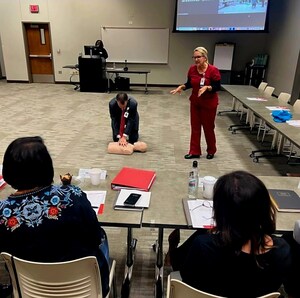CHICAGO, April 25, 2011 /PRNewswire-USNewswire/ -- Nearly 1,200 experts in cardiovascular medicine, vascular biology, endocrinology, hematology and other disciplines are expected to attend the American Heart Association's Arteriosclerosis, Thrombosis and Vascular Biology (ATVB) 2011 Scientific Sessions, April 28-30, in Chicago, Ill. The conference will include nearly 700 abstracts, plus about 100 invited oral presentations, representing a breadth of research on vascular biology and disease.
(Logo: http://photos.prnewswire.com/prnh/20100222/AHSALOGO)
"This is the most comprehensive meeting worldwide that reports on fundamental research exploring the mechanisms underlying atherosclerosis, blood clotting and related disorders, and peripheral vascular disease," said Murray W. Huff, Ph.D., conference co-chair and director of the Vascular Biology Research Group for the Robarts Research Institute at the University of Western Ontario.
The meeting is a collaboration between the American Heart Association's Council on Arteriosclerosis, Thrombosis and Vascular Biology and Council on Peripheral Vascular Disease and the Society of Vascular Surgery.
"Leading-edge basic science research will be presented side-by-side with emerging frontiers in clinical medicine," said Robert Hegele, M.D., co-chair and director of Robarts' Blackburn Cardiovascular Genetics Laboratory and London Regional Genomics Centre.
Basic science research presented at past ATVB meetings has laid the groundwork for improved therapies in cardiovascular care.
"Research previously presented about HDL ― the 'good cholesterol' ― has yielded the development of drugs known as CEPT inhibitors," Huff said. "These have the potential to become new treatments that could stimulate reverse cholesterol transport, a process in which cholesterol is removed from the inner walls of arteries."
"CEPT inhibitors may even represent the next frontier for preventing heart disease and stroke," Hegele said.
Other previous ATVB presentations that have paved the way for medical advances include: studies about new mechanisms of blood clotting, which are yielding better drugs to prevent dangerous blood vessel clots from forming; stem cell research leading to clinical trials aimed at stimulating new blood vessel growth in patients with peripheral vascular disease; and gene discoveries explaining the biochemistry behind vascular disease, improving risk prediction, and suggesting targets for new treatments.
NR11-1068 (ATVB mtg/Huff/Hegel)
Contact:
Cathy Lewis – (214) 706-1324; [email protected]
Kristi Manning – (214) 706-1538; [email protected]
SOURCE American Heart Association
WANT YOUR COMPANY'S NEWS FEATURED ON PRNEWSWIRE.COM?
Newsrooms &
Influencers
Digital Media
Outlets
Journalists
Opted In





Share this article